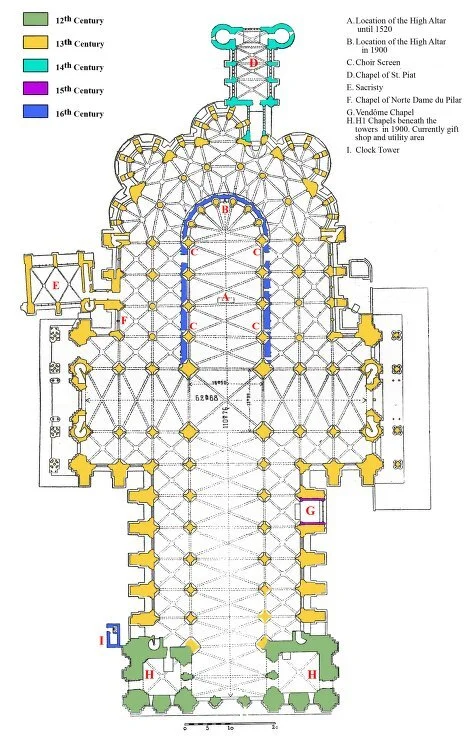Singing in Harmony with Heaven
The Living Tradition of Catholic Sacred Music and its Renewal Today
How can the music heard today in the Catholic Church be renewed so as to faithfully fulfill its traditional role – to proclaim the divine dignity of the Mass, and to draw people into its contemplative dimension of reverent adoration, transformation, and loving communion? Please join me as we study the oft-neglected but luminous path which the Church has charted for this inspired renewal, and as we share our questions and challenges along the way.
Repertoire 7: Singing in Harmony with the Angels
“Above, the hosts of angels sing praise; below, men form choirs in the churches and imitate them by singing the same doxology... The inhabitants of heaven and earth are brought together in a common assembly; there is one thanksgiving, one shout of delight, one joyful chorus.” (St. John Chrysostom) How can we participate fully and harmoniously in this "joyful chorus" when we cannot easily perceive the angels with our physical senses?
Repertoire 6: Lord, have mercy
Are we aware of the depth and breadth of meaning in the words "Lord, have mercy" as we recite or sing them in the Mass? Studying the use of the word "mercy" in the Old and New Testaments, in Church Tradition, and in the great Liturgical traditions of the East, opens up new vistas in which we see that this is not only a plea for the forgiveness of our sins, but also much more…
Repertoire 5: The Penitential Rite
Outside of the world of opera, isn’t there something fundamentally incompatible between sincere penitence and singing? How then has the Liturgy brought these two seemingly contradictory acts into harmony with one another?
Repertoire 4: "Amen" and an Overview of all the Congregational Parts
Do the liturgical musical settings we use in the Mass correspond to the description given by the Second Vatican Council – that they are to be a “new part in the musical heritage of the Church, not unworthy of its past”? Do they radiate the holiness, beauty, and universality which have characterized this heritage?
Repertoire 3: Sign of the Cross / All the Priest’s Parts
Because our seminarians and priests have typically been strongly influenced by the music of our secular culture, and cut off from an authentic living tradition of priestly chant, they are often in need of discernment and/or re-education in this important aspect of their formation.
Repertoire 2: The Introit
When we read the words “opening the celebration” in the GIRM, it is crucial to remember that the Sacred Liturgy is no ordinary celebration. It is one of transcendent dignity, instituted by Christ, handed down through the Apostles and their successors, in which heaven and earth are meant to meet.
Repertoire 1: Introduction
Let's begin by reviewing three essential principles articulated by the Second Vatican Council, which provide a clear and reasonable basis for the choice of music in the Liturgy of the Roman Rite.
Announcements and More Q & A
I am very happy to announce the resumption of my regular blogs and podcasts on the renewal of Catholic sacred music, beginning on January 6th (the traditional date of the Epiphany.)
Magnificat!
What is the resplendent light that has been shed by this singer and this song, from the depths of hiddenness and humility to the ends of the earth? And how does this this light inform our own approach to sacred music, in the midst of whatever challenges and limitations we may face?
Adoration and Aesthetics
Sacred liturgical music, whether it be traditional or contemporary, can only fulfill its purpose to the extent that it leads us, clearly and strongly, beyond itself to the silent presence of God.
A Time to be Silent, a Time to Shout
Under the Pope's strictest orders for silence, the great Egyptian obelisk was being carefully moved to the center of St. Peter's Square. But as the ropes began to fray and monument began to sway, the simple words shouted out by a sailor averted disaster and merited a great reward. We too, in our quest for the renewal of sacred music, need to know when to be silent and when - and what - to shout out.
Definitions
We need to reflect upon and define two terms which I have been using rather freely and frequently up until this point: the Sacred Liturgy and Sacred Music. A deeper understanding of these terms is fundamental to our ongoing mission!
Old Form, New Form - Part IV
As much as we might wish to think that nobility or greatness of soul is beyond our reach, the Gospels are clear that Jesus calls each of us to such magnanimity... Christ is calling us to expand our hearts, so as to share in God's tender paternal love for all people.
Old Form, New Form - Part III
"...If we become adept with our external forms of worship, however holy and venerable... but fail to grow to maturity in reverence, something essential will be missing."
Old Form, New Form - Part II
But if we have not love, as St. Paul says, we will gain nothing. This love is a fire which needs to fill our hearts and our music, so as to draw ourselves and others ever more deeply into that worship of God “in spirit and truth” to which we are called.
Old Form, New Form
The Pope [Benedict XVI] exhorts all the faithful to strive for a holy unity – a unity that flows from honoring our great liturgical traditions, acknowledging the governing authority of the Pope and Bishops, celebrating the new form with “great reverence”, and relating to one another with that magnanimity which is the fruit of authentic charity.
The Art of Renewal - Part III
Today we will be examining the third and final key in the art of the renewal of sacred music.



















